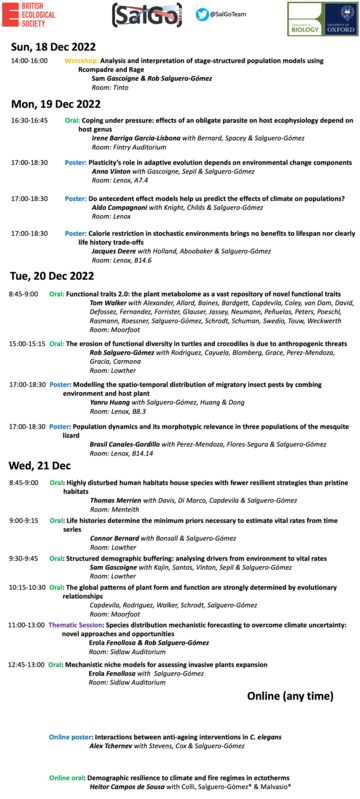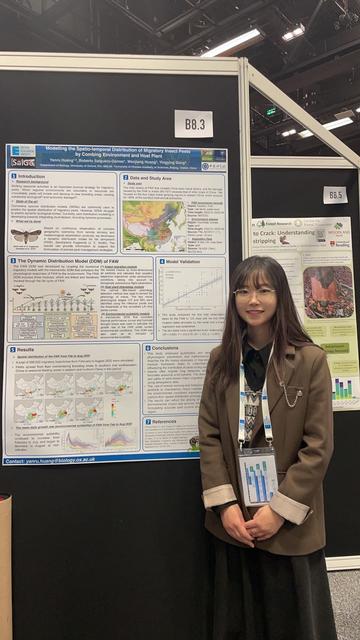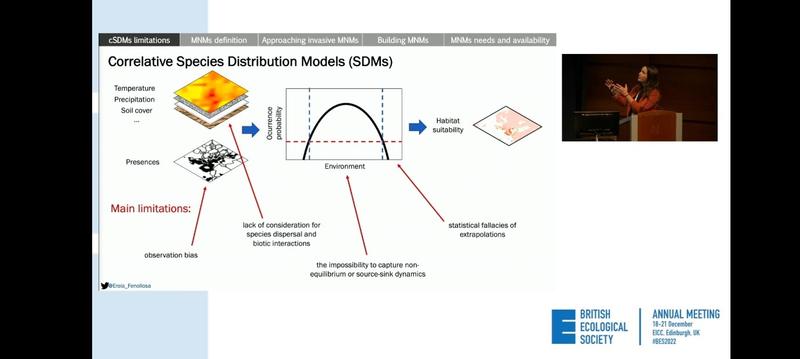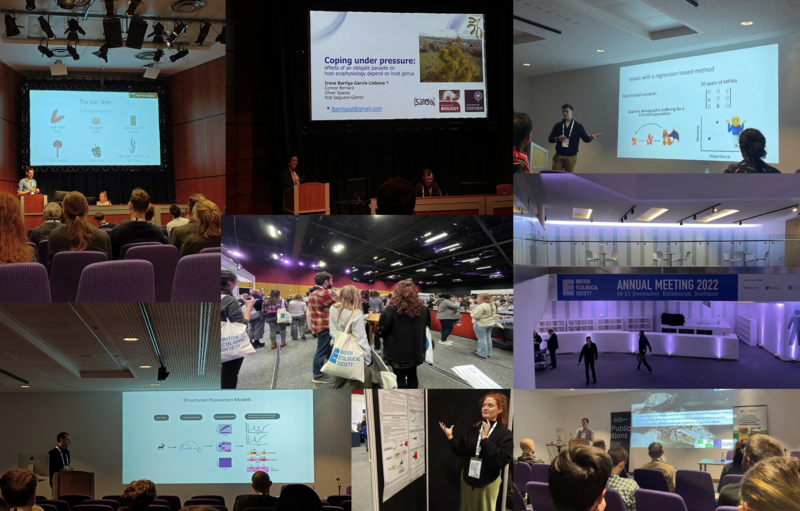(Late) Reflections on BES 2022
This last December, the SalGo team travelled to Edinburgh to attend to the British Ecological Society Annual Meeting 2022. Members of the SalGo Team contributed with 1 workshop on population modelling, 1 thematic session on species distribution models, 6 posters & 9 talks on multiple aspects of demography, evolution of plasticity, functional traits, species distributions and senescence. The contributions covered multiple taxa, from to lizards to host-parasite plant systems, and included different research types, from metanalysis to experimental studies.
It was the first time for quite a few of the members attending this conference. Below, a few reflections of two of the freshers at this conference.

Yanru Huang (PhD Student)
Attending conferences is always an exciting opportunity for researchers to learn about the latest developments in their field, and the BES conference was no exception. As a PhD student, this was the first major offline conference I attended due to the impact of the COVID-19 pandemic, and I was thrilled to be able to share my research and engage in discussions with other ecologists.
The three-day conference was packed with fascinating presentations, leaving me torn between which ones to attend. The incredible creativity and persistence displayed by the ecologists at the conference was truly inspiring, and it was amazing to see how they tackled complex ecological issues.
On the second and third day, I presented my research at the B8-invasive species session. My study focused on modeling the spatial-temporal distribution of migrating insect pests using a combination of environment and host plant data. One of the most rewarding moments of the conference was when people stopped by my poster and showed interest in my research. It gave me a sense of accomplishment to know that other researchers found my work valuable and applicable. I was also grateful for the valuable suggestions and feedback that I received from other researchers, which will undoubtedly help me improve my research.

Overall, the BES conference was an incredibly valuable experience, allowing me to learn about the latest ecological research and present my own work to a wider audience. It was an excellent opportunity to engage with other researchers, share ideas, and be inspired by the amazing work being done in the field. I look forward to attending more conferences in the future to continue learning and sharing my own research.
Erola Fenollosa (postdoc)
My first time at a BES Annual Meeting exceeded my expectations. It was not only my first time at this conference but also organizing a thematic session. During the last year we encountered with Rob that mechanistic or process-explicit Species Distribution Models (i.e. SDMs that add or are based on process-explicit aspects such as inclusion of species dispersion models, physiological tolerances, demography, etc, instead on being only based on species current registered distribution) are extremely useful tools to forecast geographic distribution of species that does not have a stable distribution such as invasive species. We become excited about it but immediately found the lack of a unified framework. We entitled the thematic session: “Species distribution mechanistic forecasting to overcome climate uncertainty: novel approaches and opportunities” and brought together different researchers working with mechanistic SDMs for different taxa, using different approaches and for different applications. The session was a total success. I felt very grateful to have the opportunity to discuss my major concerns on this topic with researchers developing similar ideas with different background. I enjoyed extremely also delivering my talk about mechanistic niche models for invasive plants, reviewing different experimental pieces of work I’ve developed recently.

Beyond the thematic session, I’ve also enjoyed the inspiring multiple talks, workshops and poster sessions during the conference. I did my best in trying to attend to all, and felt exhausted after the first day of running through the multiple rooms. In this sense I especially enjoyed the potential of the conference app Whova, that allowed me to connect and set up meetings easily with multiple researchers with whom I share interests among the hundreds of participants.
I would like also to highlight my experience at attending to the LGBTQIA+ mixer. Although fortunately, being a member of this community has not impact directly on my professional chances, fear of intolerance is always there. The mixer made me feel safe and seen, and I am very grateful to the ALDER Network for organizing it.
I am definitely looking forward for next edition in Belfast!
Below a few photos of the group presenting our research at the BES




